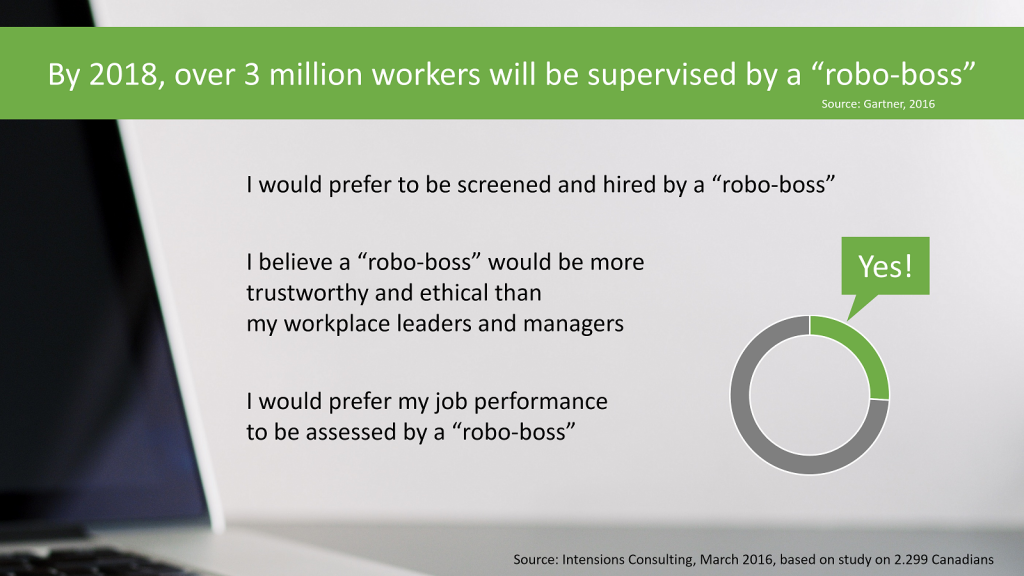Roboboss – hell or help?
By Erik Korsvik Østergaard, 23. April 2016
 The roboboss is coming
The roboboss is coming
The name “roboboss” alone sets the tone of a bad, controlling, surveying, 1984 George Orwell-esque manager. But is it really that bad? Will automation be hell or help?
Let’s walk though these 3 aspects and inputs, to show how automation changes work and sets new demands for leadership:
- Employees prefer an unbiased computer over their current leader, study finds
- In 2018, 3 mill. employees will be supervised by a “roboboss”, Gartner predicts
- It’s against the law in EU to make fully automated decisions on personal matters
Spoiler alert:
- Automation will support you, your employees, and your leader
- The future of leadership is about fairness and happiness at work
Automation is a central aspect of The Fourth Industrial Revolution (see also the Wiki page on Industry 4.0) and is correlated to both digitization, globalization, cloud computing, and mobile, and to an emerging understanding of the need for meaningfulness and purpose.
![]() Automation has for a long time been a driver for industrial revolutions in physical labor, and the speed of change and development in computing, cloud, big data, and deep learning technologies now makes it possible for automation to impact the work of both the desk worker and the broader leadership disciplines significantly.
Automation has for a long time been a driver for industrial revolutions in physical labor, and the speed of change and development in computing, cloud, big data, and deep learning technologies now makes it possible for automation to impact the work of both the desk worker and the broader leadership disciplines significantly.
Input 1: Employees prefer an unbiased computer, study finds
![]() A study by Intentions on 2.299 Canadian workers concluded among other things this:
A study by Intentions on 2.299 Canadian workers concluded among other things this:
According to the survey, 31 percent of Canadians aged 20 to 39 agreed that an “unbiased” computer program would be more ethical and trustworthy than a human boss.
Thirty-four percent said they would rather be hired by an “unbiased” computer program, 33 percent would prefer to be assessed, and twenty six percent said they would prefer to be managed by a robot.
The consulting firm behind the study commented: It’s no wonder that so many young Canadians would rather a computer program do the job. (…) “Cognitive bias, which is a very human condition, can make our jobs quite tough,” said Nikolas Badminton, a Canadian futurist and biohacker who helped write the survey questions. “Some people, like HR people and managers, kind of need to get out of the way so a better job can get done.”
To support that, here is the Wiki list of cognitive biases, that employees – especially the younger – want to avoid. That’s a LONG list.
The responses are clear signals to the current leadership and a cry for a new approach. We want a leader (robot or not) that is fair, and acknowledges me and my work in fairness.
Other data highlights from the study
See all results from the study and the full data view here.
On-boarding
- If applying for a new job, I would prefer to be screened and hired by an unbiased computer program
26 % Strongly Agree + Agree
Management
- I would prefer my workplace to be managed by an unbiased computer program.
21 % Strongly Agree + Agree - I believe an unbiased computer program would be more trustworthy than my workplace leaders and managers
26 % Strongly Agree + Agree - I believe an unbiased computer program would be more ethical than my workplace leaders and managers
26 % Strongly Agree + Agree
Assessment
- I would prefer my job performance to be assessed by an unbiased computer program
26 % Strongly Agree + Agree
Input 2: By 2018, more than 3 million workers globally will be supervised by a “robo-boss”, Gartner predicts
In October 2015 Gartner published “Gartner Predicts Our Digital Future“: “Some performance measurements can be consumed more swiftly by smart machine managers aka “robo-bosses,” who will perform supervisory duties and make decisions about staffing or management incentives.”
That’s 3 million in only 2 years, being embraced and affected by automation.
Interesting part is also that they predict “supervision”, and not “support” or “relief”. Maybe it’s a word that I interpret more dystopic than intended from Gartner …
 Input 3: Currently, it’s against the law in EU for robo-bosses to make autonomous decisions
Input 3: Currently, it’s against the law in EU for robo-bosses to make autonomous decisions
Check out this except from “Directive 95/46/EC of the European Parliament and of the Council of 24 October 1995 on the protection of individuals with regard to the processing of personal data and on the free movement of such data”.
Article 15
Automated individual decisions
1. Member States shall grant the right to every person not to be subject to a decision which produces legal effects concerning him or significantly affects him and which is based solely on automated processing of data intended to evaluate certain personal aspects relating to him, such as his performance at work, creditworthiness, reliability, conduct, etc.
So, it’s against the law in EU to base decisions on e.g. performance at work on a robo-boss alone. A human being must take the final decision, hence the robo-boss may only provide guidance and decision support.
The question is when this jurisdiction will need an update to remove the human bias or to embrace areas where we can allow the automation to decide for us.
So, how can the robots help us?
According to the study in Canada:
“People are losing faith in human management, and rightly so. Who would you trust, a human with personal biases and opinions or a rational and balanced AI? These results are not surprising, and I expect to start seeing automated HR and management systems being deployed in the next 3 to 5 years – with a human touch to maintain creativity and empathy. Flexibility and empowerment will be the new work currencies and productivity will be redefined.“
Here are some examples of where the robo-boss will support you, ranging from the mundane to the judging:
- The iOS 9 traffic helper, notifying you about when to leave for the next meeting
- Scripts and software to handle trivial, repetitive work, e.g. in finance, by handling bookkeeping, invoices, regulatory aspects, and taxes. Here’s a Danish example (in Danish): Martin Thorborg i ny satsning: Vil erstatte revisorer med robotter (and a Google Translate version – which in itself is an example of a robot)
- Translation services
- Creating duty rosters, taking into account personal preferences and availability
- Finding spots for calendar bookings, e.g. Meekan
- Distribute information based on preferences
- Taking notes and creating minutes of meetings
- Notifying you of when you should consider starting the next piece of work
Gartner writes: “Content that is based on data and analytical information will be turned into natural language writing by technologies that can proactively assemble and deliver information through automated composition engines. Content currently written by people, such as shareholder reports, legal documents, market reports, press releases and white papers are prime candidates for these tools.”
And the more sensitive tasks:
- Spotting talent via deep learning and big data
- Finding the right people to hire – and promote, see e.g. IBM Watson’s personality reader is creepily accurate about which is said “IBM Watson is capable of using text – in your emails, speech, or social media – to analyse the soft facts of a person; not just what you did, but also how you interact with people, how you react in specific situations. HR departments are very strong at analysing the people that are actually applying for specific jobs but it’s very labour intensive, and this is harder if there’s no budget or time.”
- Analyzing the internal informal network and relations (Organizational Network Analysis), and spotting weak links, people who will leave in a few months, or rising stars)
“Can’t afford a PA? Don’t worry IBM Watson’s here to help you.” “Meet Amy: A virtual PA that is fixing my meetings” - Assessing results and progress according to expectations
- Supporting you in decision-making, giving unbiased input and possibilities for actions
- Creating strategic scenario-simulations, eliminating the guesswork in setting direction
Gartner writes: “Some performance measurements can be consumed more swiftly by smart machine managers aka “robo-bosses,” who will perform supervisory duties and make decisions about staffing or management incentives.”
What is the future of leadership, with the support of the robo-boss?
Your primary task in the future is to ensure happiness at work. Happiness. At work.
According to the studies and predictions above, you should focus on:
- Fairness
- Purpose and meaning
- Well-being
- Empathy
The new behavior of a leader is still those 8 patterns. ![]() The robo-boss will be able to relieve you of the tedious tasks, and free up time to being creative and work with your relations. The robo-boss will help you by predicting your behavior and suggesting your next tasks, will spot relations that need care, and will come with strong proposals for who to hire and who are the talents.
The robo-boss will be able to relieve you of the tedious tasks, and free up time to being creative and work with your relations. The robo-boss will help you by predicting your behavior and suggesting your next tasks, will spot relations that need care, and will come with strong proposals for who to hire and who are the talents.
Our newsletter is filled with articles and tools
for the modern
future-oriented leader
Get free, useful tips and tools
that will help you navigate the future
and enhance your leadership already today







